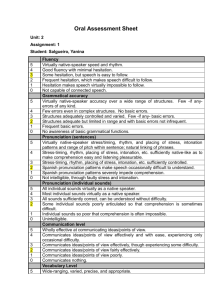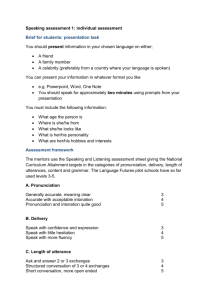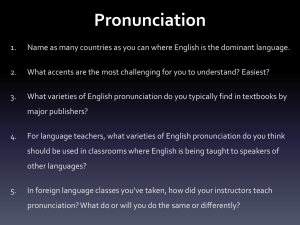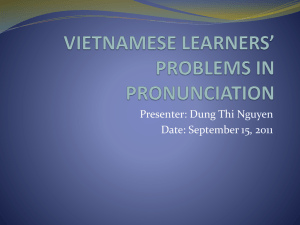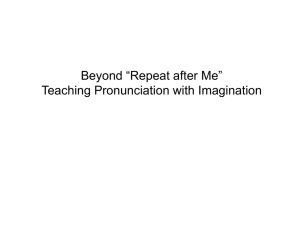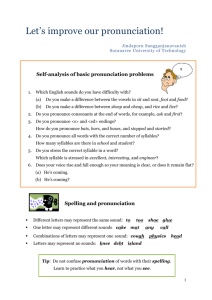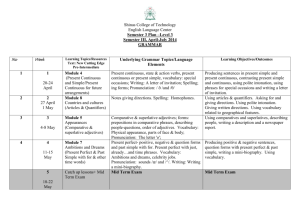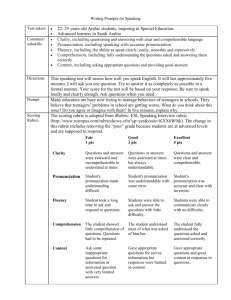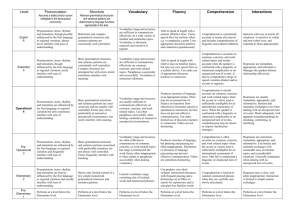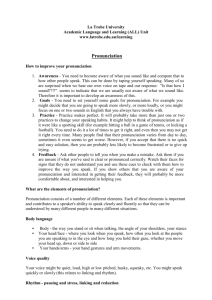Oral Presentation Evaluation Form
advertisement
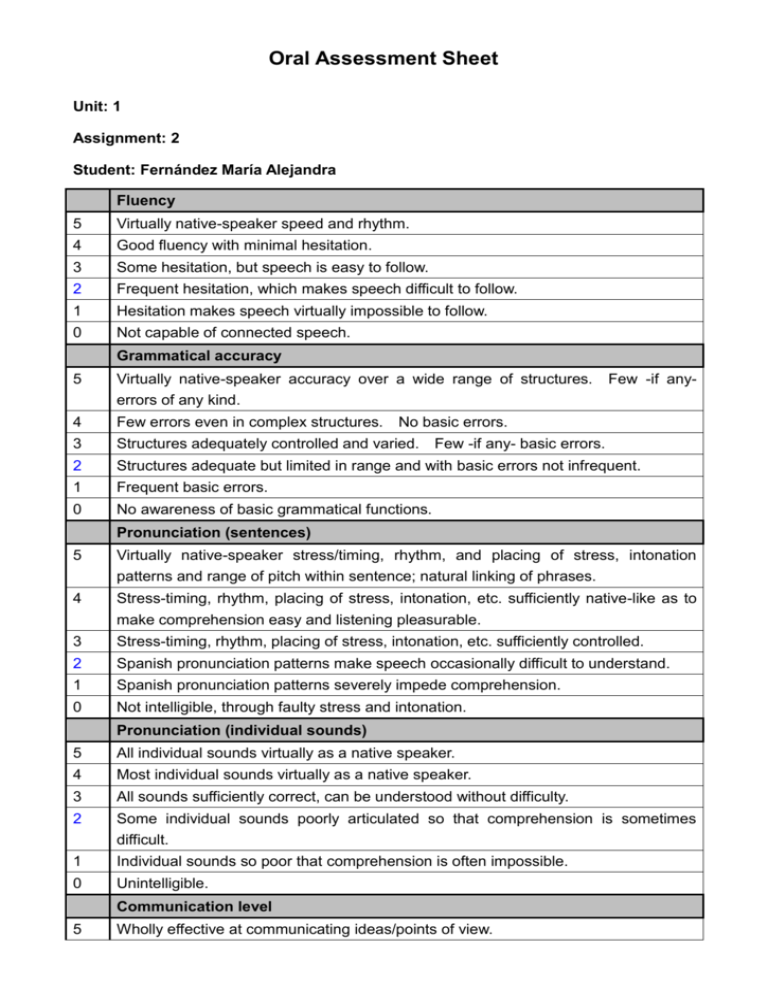
Oral Assessment Sheet Unit: 1 Assignment: 2 Student: Fernández María Alejandra Fluency 5 Virtually native-speaker speed and rhythm. 4 Good fluency with minimal hesitation. 3 Some hesitation, but speech is easy to follow. 2 Frequent hesitation, which makes speech difficult to follow. 1 Hesitation makes speech virtually impossible to follow. 0 Not capable of connected speech. Grammatical accuracy 5 Virtually native-speaker accuracy over a wide range of structures. errors of any kind. Few -if any- 4 Few errors even in complex structures. 3 Structures adequately controlled and varied. Few -if any- basic errors. 2 Structures adequate but limited in range and with basic errors not infrequent. 1 Frequent basic errors. 0 No awareness of basic grammatical functions. No basic errors. Pronunciation (sentences) 5 Virtually native-speaker stress/timing, rhythm, and placing of stress, intonation patterns and range of pitch within sentence; natural linking of phrases. 4 Stress-timing, rhythm, placing of stress, intonation, etc. sufficiently native-like as to make comprehension easy and listening pleasurable. 3 Stress-timing, rhythm, placing of stress, intonation, etc. sufficiently controlled. 2 Spanish pronunciation patterns make speech occasionally difficult to understand. 1 Spanish pronunciation patterns severely impede comprehension. 0 Not intelligible, through faulty stress and intonation. Pronunciation (individual sounds) 5 All individual sounds virtually as a native speaker. 4 Most individual sounds virtually as a native speaker. 3 All sounds sufficiently correct, can be understood without difficulty. 2 Some individual sounds poorly articulated so that comprehension is sometimes difficult. 1 Individual sounds so poor that comprehension is often impossible. 0 Unintelligible. Communication level 5 Wholly effective at communicating ideas/points of view. 4 Communicates ideas/points of view effectively and with ease, experiencing only occasional difficulty. 3 Communicates ideas/points of view effectively, though experiencing some difficulty. 2 Communicates ideas/points of view fairly effectively. 1 Communicates ideas/points of view poorly. 0 Communicates nothing. Vocabulary Level 5 Wide-ranging, varied, precise, and appropriate. 4 Shows few vocabulary gaps. 3 Adequate. 2 Vocabulary -though adequate- seldom rises above the mundane. 1 Lack of vocabulary makes performance inadequate. 0 Vocabulary too slight for communication at this level. Alejandra You will have to keep working hard on your pronunciation, particularly on your rhythm and intonation, since your speech still sounds flat. You also made a number of grammar and vocabulary errors, some of which I've listed below for you to reflect on them. you should have said "my biggest dream IS to BECOME..." you should have said "TO STUDY TO BECOME a teacher of English"; "how TO OVERCOME". you should have said "can STUDY". Never use the "to infinitive" after a modal verb, you need the "bare infinitive" instead (infinitive without "to"). you should have said "WILL NOT pass", not "will do not pass" (you're mixing up two tenses) check the pronunciation of the following words: enrolled, because, education, tutor, how, cybermate. there are some unintelligible parts, for example at 1:05. remember hesitation noises should sound /ɜː/ I'm afraid this production is rather below standard, bear my comments in mind when you record your next audiofile. This assignment is not to be redone. Carina Luc NB Please read "Lineamientos Generales" for instructions on how to name assignment files. Unfortunately, there isn't such a thing as a "guide" to help you start thinking in English, not in Spanish. It'd certainly be useful, but there is not magic recipe for that. I've surfed the net and found the following tips. Hope this helps: Here are some action steps you can take in order to start thinking in English. 1) Talk to yourself in English aloud. Yes, you can narrate what you are doing as you do it, on a daily basis. Here is an example: "It is 8am and I am thinking of getting up. Should I get up? Maybe I should sleep in 10 minutes longer. Where is my phone? I thought it was under my pillow. Oh wait, there is on the floor. It must have fallen off the bed. Actually, I feel more awake now. I should get up. I'm going to throw off the covers and sheets and roll out of bed. Oh no! The floor is freezing. Where are my slippers?" Do you get the idea? You can talk to yourself aloud and have conversations with yourself describing your surroundings. This will help you get used to speaking in English (in a natural and fluid way) and will also improve your ability to think in English. The more you speak to yourself, the easier it will be to think to yourself. Also, if you look at what I wrote above you will notice that I used lots of phrasal verbs. Studying phrasal verbs and trying to incorporate them into your self-talk would be really useful, as phrasal verbs are essential to everyday English. Actually, what you could do (to make yourself accountable) is join the Learn English Corner (LEC) (if you haven't already) and start an audio blog with the help of audioboo.com There you could record up to 5 mins of "self talk" and post it on a daily basis in your blog. It would be a great way to keep yourself accountable and speaking to yourself on a daily basis. 2) Describe your surroundings but in your head. I will do it right now. "I'm sitting on my couch and my friend Travis is sitting on the other end of the couch checking his email with his iphone. My husband is watching YouTube videos on the desktop computer across the room. It is 8:30pm and we are being lazy. The sun is setting and I can hear birds in the background. There are also people talking in the street below." Like I said before, the best way to improve something is by doing it. 3) Question and answer sessions in your head. Ask a question related to your surroundings. "Why is my husband watching YouTube?" Then you can create possible answers and even debate about them in your head. I think he is watching YouTube to learn English. For example: What? Are you kidding Diana? He's not trying to learn English. He is trying to learn about world war two. That's not right Diana. He is totally trying to improve his English. Look! He is watching a presidential speech right now and making notes. So in short, the best way to begin thinking in English is to force yourself to speak and think in English. If you find that you do not know many useful vocabulary words to fully express yourself I would recommend watching a good TV series to boost your listening comprehension and learn some natural and useful expressions. Basically, you will be able to think in English once you focus on speaking in English because thinking is just speaking...in your head. Try your best!!!
